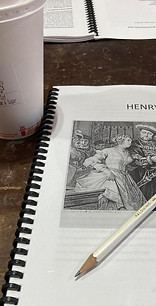
MISSION
BSF dismantles barriers to understanding and enjoying Shakespeare by unpacking his works in a way that is deeply rooted in the text and that connects to the lives and experiences of our communities.
ABOUT
Baltimore Shakespeare Factory (BSF) is a 501(c)(3) non-profit organization.
Baltimore Shakespeare Factory (BSF) is an equal-opportunity nonprofit organization committed to serving a diverse population. BSF does not discriminate against individuals based on race, creed, color, gender, gender identity, sexual orientation, religion, national origin, familial status, age, citizenship status, veteran status, or the presence of any disability.
This policy extends to staff, administration, actors, performers, designers, board members, and volunteers.
PERFORMANCE VISION
It is the objective of Baltimore Shakespeare Factory to recreate, as closely as is possible within a modern context, the staging conditions, spirit, and atmosphere created by Shakespeare’s theatre company during the Elizabethan and Jacobean periods.
Photos taken by EG Photography during Gallathea 2023, cast during Twelfth Night 2022, and educational programming in 2024.

VERSE
Shakespeare’s plays are written primarily in blank verse (unrhymed iambic pentameter), but he also wrote in other verse forms and in prose as well. We make Shakespeare's poetry clear to the audience by speaking the lines differently. Our company spends a great deal of time in analyzing Shakespeare’s text and determining how this poetry informs our performance choices.

SETS
Very few set pieces seemed to have been used for a typical production in Shakespeare’s time – the theatre itself was the set, and audiences were expected to use their imaginations. We think that is a good thing; it puts the focus on the language, the acting, and the story. Therefore, we also keep sets to a minimum, using only what actors can carry on and off with them.

CLARITY
It is our goal to make Shakespeare’s works more easily comprehensible to the modern ear. Our actors engage in intense text work that includes careful analysis of the diction and the rhetorical devices that were major parts of Shakespeare’s composition. In this way, we help the audience understand and enjoy these masterpieces as they were written, without ever “dumbing it down.”

COSTUMES
Whereas the sets were meager, costumes were often elaborate and colorful. Costumes were also important in order for an audience to immediately identify a character type or to differentiate between characters that are doubled. However, the costumes used in that time were often a mixture of historically inaccurate styles; this is why we allow our actors to choose from costumes ranging from Greco-Roman to Elizabethan all the way to the modern era.

UNIVERSAL LIGHTING
Whether in the outdoor Globe Theatre or in the indoor Blackfriars Theatre, the lights were always on during a play in Shakespeare’s time. Actors and audience could see one another and frequently interacted. The “fourth wall” and proscenium arch present in most theatres today did not exist. That’s why house lights are up in our indoor venues throughout the show.

DOUBLING
Doubling parts (more than one part played by one actor) was a feature of theatre companies in the Elizabethan and Jacobean periods. Without doubling, many of Shakespeare’s plays would require a cast of over 30 actors!

AUDIENCE INTERACTION
People should not feel they are AT a play – they should feel that they are IN a play. Many speeches and comments in Shakespeare’s plays were spoken directly to the audience in general or to specific audience members. With actors and audience all sharing the same light, there are many opportunities for this.

MUSIC
Shakespeare’s plays are filled with music, and we also want our productions to include musical entertainment. Shakespeare used the popular music of his time, so we use the music of our time in our pre-show and interludes. Our casts work together to select songs related to the show themes and that will have fun for the whole family!

GENDERLESS CASTING
In Shakespeare's time, all the roles on professional stages in England were performed by men. Evidence indicates that most of Shakespeare’s most famous female roles, such as Juliet and Cleopatra, were played by young boys. If gender-fluid casting was the norm then, we want to offer all our actors the opportunity to play all the roles today. After all, it’s only fair, isn’t it?

LENGTH
In the Prologue to Romeo and Juliet, Shakespeare does make reference to the play being the “two hours’ traffic of our stage.” BSF believes that our productions must be FUN and FAST to keep the audience engaged, so we employ quick pacing and a continuous flow of action to keep the performance of our plays as close to two hours as is possible.
BALTIMORE SHAKESPEARE FACTORY THEATRE STANDARDS
In 2018, BSF's Board of Directors voted to adopt the Baltimore Shakespeare Factory Theatre Standards (or BSFTS).
This document, modeled (with permission) on the Chicago Theatre Standards, is a tool for self-governance that
seeks to nurture communication, safety, respect, and accountability of participants at all levels of
theatrical production.
Click to download the BSFTS: